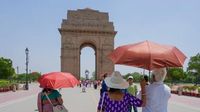Delhi and its surrounding areas are currently experiencing a significant weather shift, bringing some relief from the intense heat that has gripped the region. On Friday, April 25, 2025, the national capital recorded its hottest day of the season, with temperatures soaring to 43.3 degrees Celsius at the Ridge station and 41.7 degrees at Safdarjung, which is four degrees above normal. However, Saturday saw a sudden change, with cloudy skies and strong winds sweeping across Delhi.
The India Meteorological Department (IMD) has forecasted light rain or drizzle for the afternoon, accompanied by winds ranging from 30 to 40 km/h, with gusts potentially reaching up to 50 km/h. This sudden shift is a welcome change for residents who have been grappling with heatwave conditions, which are defined by the IMD as temperatures exceeding 40 degrees Celsius in the plains.
Despite the cloud cover, the IMD cautioned that heatwave conditions may still persist in some areas. The forecast for Saturday indicates a maximum temperature of 42 degrees Celsius and a minimum of around 24 degrees. On Friday, the air quality in Delhi was also a concern, remaining in the 'poor' category, with an Air Quality Index (AQI) reading of 258 at 4 PM, according to the Central Pollution Control Board (CPCB).
"The average air quality index on Friday was at 258 points, indicating poor air quality conditions," an official from the CPCB stated. This level of pollution is alarming, especially as it marks the fifth consecutive day of poor air quality in the city, with the Wazirpur area recording an AQI of 374, classified as very poor.
As the heatwave conditions persisted, Delhi's residents faced not only high temperatures but also increased pollution levels. The IMD noted that many areas in Delhi recorded temperatures consistently 3 to 4 degrees above normal throughout April, with three days already marked by heatwave conditions. The Ridge station's record of 43.3 degrees Celsius on Friday was particularly concerning.
In a related development, the Delhi Airport issued a traffic advisory on Friday, warning that changes in wind patterns could lead to delays in flight operations. The advisory urged passengers to check their flight statuses due to potential disruptions.
On Saturday, the weather began to shift as strong winds brought some respite from the oppressive heat. The IMD issued a yellow alert for multiple regions of Delhi, forecasting light rain and thunderstorms in the evening. Areas such as Noida, Faridabad, and Gurgaon were also expected to experience similar weather conditions, providing much-needed relief to residents.
"A subtropical trough has formed over northwest India, which may trigger thunderstorms and dust storms over the region during the next few hours," the IMD warned, advising residents to stay updated with the latest forecasts.
As the temperatures are expected to drop in the coming days, the IMD predicts that the maximum temperature could fall to around 40 degrees Celsius, providing a break from the heatwave conditions. This cooling trend is likely to continue until at least May 2, 2025.
In contrast to the heatwave affecting Delhi, neighboring Pakistan is bracing for its own heatwave, with temperatures expected to rise significantly over the weekend. The Pakistan Meteorological Department has warned that a high-pressure system will develop over the upper atmosphere, leading to soaring temperatures in southern Sindh, southern Punjab, and Balochistan.
Residents in these regions are advised to take precautionary measures to mitigate the risks associated with extreme heat, particularly vulnerable populations such as children, women, and the elderly.
As the weather patterns continue to evolve, Delhi's residents are encouraged to remain vigilant and prepared for further fluctuations in temperature and air quality. The IMD's forecasts indicate that while some relief is on the way, the challenges posed by heat and pollution are far from over.
Overall, the changing weather in Delhi serves as a reminder of the ongoing climate challenges faced by urban areas, where extreme heat and pollution often intersect, impacting the health and well-being of millions.





